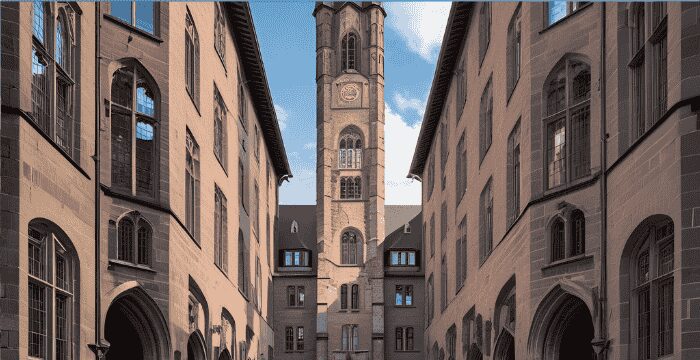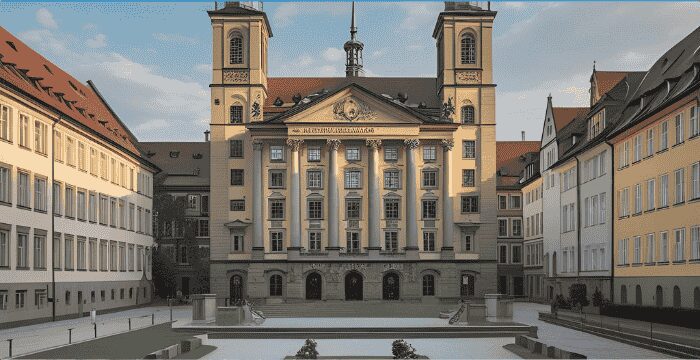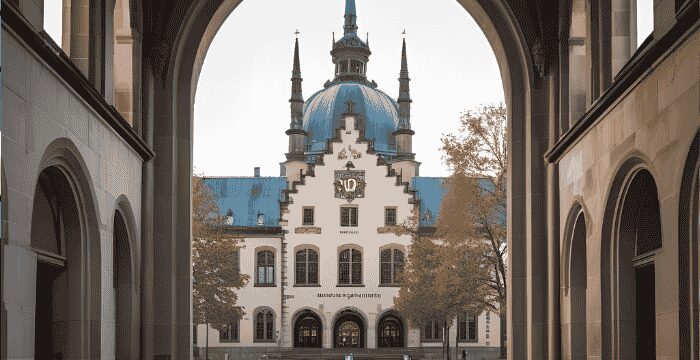Germany has become a top destination for international students pursuing a master’s degree in computer science. Because upwards of 40 universities deliver internationally recognised MS programs, the nation marries academic excellence with real-world, hands-on industry experience. Regardless of whether your passion lies in artificial intelligence, cybersecurity, or data science, German universities offer top-tier education that paves the way to career prospects on the world stage. If you’re searching for the best universities in Germany for masters in computer science, you’re in the right place.
Top facts and news—2025 edition: Capture your curiosity!
Germany’s computer science academic arena continues to propel forward through a series of captivating developments. Here’s why the best universities in Germany for masters in computer science are making headlines:
- More than 40 German universities offer internationally renowned Master’s programs in Computer Science.
- Technical University of Munich (TUM) consistently ranks in the global top 30 for Computer Science, making it one of the best universities in Germany for Master’s in Computer Science.
- At most public universities, international students pay no tuition; however, they must still pay a nominal semester fee.
- More than half of the computer science master’s programs offered in Germany through the English language give international students ready access.
- Novel recruits are avidly sought by Germany’s technology giants—among them SAP, Bosch, and Siemens.
- Within six months after graduation, the average employment rate for MS in Computer Science surpasses 90%.
- International students have numerous scholarship opportunities and funding options available to them.
- Leading universities are quickly broadening their research initiatives in AI, robotics, and cybersecurity.
- The QS World University Rankings 2025 lists 7+ German universities in the global top 200 for Computer Science, many of which are among the best universities in germany for masters in computer science.
- Germany’s skilled-worker immigration reforms (2024) render it simpler for international graduates to remain in the country and begin their careers.
Why study a Master’s in Computer Science in Germany?
There are multiple compelling reasons for selecting Germany as an outstanding destination for earning a masters in computer science. Famed for their engineering and technological excellence, the nation’s universities provide high-calibre education that combines theoretical learning with real-world practice through research and internship opportunities. Many of the top universities in Germany for master’s degrees in computer science also provide robust support for international students.
Academic Excellence, coupled with Worldwide Recognition
German universities continually feature among the world’s leading institutions for computer science education. Its dedication to research and innovation has fostered an environment where students can work with the newest technologies and approaches. Institutions such as TUM and RWTH Aachen maintain close collaborations with leading firms, ensuring that their curricula remain aligned with prevailing market demands. This is why many students target the top universities in Germany for a Master’s degree in Computer Science each year.
Cost-Effective Education
A major draw of pursuing higher education in Germany is its affordability. At most public universities, international students pay no tuition fees at all, and only make semester-based contributions of €100–€350. This makes Germany significantly more affordable than other popular study destinations, such as the US or UK, and is a significant draw for those researching the best universities in Germany for a master’s degree in computer science.
A robust employment market, along with promising career prospects
Due to its thriving tech sector, Germany provides graduates with numerous professional opportunities. As of late 2023, the nation faced a workforce shortage in IT, with more than 149,000 positions still vacant. Major companies like SAP, Siemens, BMW, and Deutsche Telekom actively recruit from German universities, especially from the best universities in germany for masters in computer science.
Opportunities in the Post-Study Work phase
Once their studies have been completed, international graduates are eligible to apply for an 18-month job seeker visa, affording ample time to find employment in one of Europe’s strongest economies. This policy demonstrates Germany’s commitment to retaining international talent and is a common benefit highlighted by the best universities in Germany for master’s in computer science.
Top 10 Best Universities in Germany for Masters in Computer Science
The following table presents the best universities in Germany for masters in computer science based on global rankings, research output, and industry reputation:
| University | QS Ranking 2025 | Location | Program Duration | Annual Fees (EUR) | Key Specializations |
| Technical University of Munich (TUM) | 31 | Munich | 4 semesters | €1,500-€6,000 | AI, Machine Learning, Data Science |
| RWTH Aachen University | 97 | Aachen | 4 semesters | €624 | Robotics, Embedded Systems |
| Karlsruhe Institute of Technology (KIT) | 105 | Karlsruhe | 4 semesters | €1,500 | Cybersecurity, Visual Media |
| Technical University of Berlin | 74 | Berlin | 4 semesters | €5,500 | Software Engineering, AI |
| Ludwig Maximilian University (LMU) | 90 | Munich | 4 semesters | €1,500 | Data Science, Interdisciplinary Research |
| University of Stuttgart | 314 | Stuttgart | 4 semesters | €1,500 | Computer Networks, HCI |
| Technical University of Darmstadt | 162 | Darmstadt | 4 semesters | €220 | Machine Learning, Data Engineering |
| University of Freiburg | 212 | Freiburg | 4 semesters | €3,000 | Software Systems Engineering |
| University of Bonn | – | Bonn | 4 semesters | €647 | Applied Computer Science |
| Heidelberg University | 155 | Heidelberg | 4 semesters | €302 | Data & Computer Science |
1. Technical University of Munich (TUM)
TUM stands as Germany’s premier institution for computer science master’s programs and is often ranked among the best universities in Germany for master’s degrees in computer science. TUM ranks 31st in the QS World University Rankings 2025 and offers comprehensive programs in computational science, data science, and artificial intelligence.
Program Highlights:
- Firm emphasis on AI, machine learning, and big data analytics
- Nestled within the vibrant tech hub of Munich, which counts companies such as BMW and Google among its residents
- Wide-ranging collaborations with industry produce numerous internship and career prospects.
- An international body of students hailing from more than 100 nations
- Admission Requirements:
- Bachelor’s degree in Computer Science or a closely related field
- For the program to be offered in English, admission requires a score of 6.5 or higher on the IELTS or 90 or above on the TOEFL.
- Accel
2. RWTH Aachen University
RWTH Aachen University stands out. Due to its robust industry ties, particularly in the automotive and manufacturing sectors, the university provides students with exceptional practical experience. It’s frequently listed among the best universities in Germany for Master’s in computer science.
Program Highlights:
- Research forefront in robotics and automation
- Daffo has attractive partnerships with leading German industrial companies.
- Graduate employment rates that soar above 95%
- Contemporary research infrastructures and laboratories
Unique Features:
- International students do not pay any of the tuition fees.
- For €624 per semester, the fee fully covers administrative expenses and public transport.
- Programs taught in English are offered.
3. Karlsruhe Institute of Technology (KIT)
KIT’s renown derives from its outstanding research strength in cybersecurity and computational visual media. University-level academic teaching is coupled with major-scale research at the institute, a combination that distinguishes it from the rest of the German higher education landscape. KIT is consistently ranked among the best universities in Germany for Master’s in Computer Science.
Program Highlights:
- State-of-the-Art Research in Cybersecurity and Data Protection
- A pronounced concentration on computational visual media and graphics
- Outstanding industry ties along southwestern Germany’s tech corridor
- Festive campus equipped with state-of-the-art facilities
Research Opportunities:
- Partnership with leading technology corporations
- Favoured access to cutting-edge computing resources
- Made up of interdisciplinary research projects
4. Technical University of Berlin
Located in Germany’s startup capital, TU Berlin provides a vibrant environment for computer science students and international students alike. The university’s location offers unique opportunities for networking and entrepreneurship, making it one of the top universities in Germany for a master’s degree in computer science for those interested in innovation.
Program Highlights:
- A pronounced emphasis on research within both software engineering and artificial intelligence.
- Situated within Berlin’s vibrant technology ecosystem
- Wide-ranging startup incubation initiatives
- International student body of diverse backgrounds
City Advantages:
- Viewing of leading tech startups along with well-established companies.
- Vibrant cultural life and low cost of living.
- Well-developed public transportation system
5. The Ludwig Maximilian University of Munich (LMU Munich)
At LMU Munich, time-honoured scholarly excellence unites with cutting-edge computer science research. Through its interdisciplinary approach, the university invites students to explore connections between computer science and other relevant fields. It’s consistently recognized as one of the best universities in Germany for masters in computer science.
Program Highlights:
- Strong data science and analytics programs
Interdisciplinary research opportunities - Collaboration with Munich Centre for Machine Learning (MCML)
-
First-class research infrastructure and resources
Academic Environment:
- Cooperation with the Max Planck Institutes
- Ready access to leading-edge research projects
- A robust alumni network within academia as well as industry
6. University of Stuttgart
The University of Stuttgart dedicates itself to computer networks and human–computer interaction. In the English-language track of its master’s program, the university provides three specialisations: Autonomous Systems, Service Technology and Engineering, and Visual Computing. This diversity places it among the best universities in Germany for masters in computer science.
Program Highlights:
- The program presents three separate yet distinct areas of specialisation.
- Having flourishing sector links in Baden-Württemberg’s tech sector.
- The research concentrates primarily on autonomous systems and visual computing.
- Congratulations on its outstanding job placement rates.
Location Benefits:
- Right at the heart of Europe’s foremost technology hub
- The school’s close location to major automotive companies and technology firms
- Outstanding research and development ecosystem
7. Technical University of Darmstadt
TU Darmstadt stands out in research on machine learning and data engineering. The university’s affordable fees and strong academic programs make it an attractive option for international students and a regular feature on lists of the best universities in Germany for masters in computer science.
Program Highlights:
- Forefront research in machine learning algorithms
- Sound data engineering and analytics programs
- Inexpensive semester fees of just €220
- A wide-ranging international student community
Research Focus:
- Highly advanced machine learning techniques
- Big data processing and analytics
- Applications in artificial intelligence
8. University of Freiburg
At the University of Freiburg, software systems engineering forms the core of its research-centric curriculum. The university’s programs emphasise both theoretical foundations and practical applications, making it a top pick among the best universities in Germany for a masterS in computer science.
Program Highlights:
- Wide-ranging software systems engineering curriculum
- A vibrant research culture, along with an array of opportunities.
- Lovely campus situated in southwestern Germany
- Outstanding student support services
Academic Strengths:
- Software engineering methodologies
- Systems design and architecture
- Research-driven learning model
9. University of Bonn
The University of Bonn grants students cutting-edge research opportunities in computer science. The university’s programs combine traditional computer science with emerging technologies and applications, and it is regularly included in rankings of the best universities in Germany for masters in computer science.
Program Highlights:
- Proven success in a wide spectrum of CS domains
- Semester charges remaining under €650.
- Outstanding faculty-to-student ratios
- Ready access to cutting-edge computing infrastructure
10. Heidelberg University
Heidelberg University’s Master’s program in Informatics, Germany, combines computer science with data science applications. The university’s interdisciplinary approach prepares students for diverse career paths, and it’s often mentioned among the best universities in Germany for masters in computer science.
Program Highlights:
- A unified curriculum that slots together data science and computer science programs
- Robust research possibilities
- A historic institution housed in modern facilities
- An outstanding international reputation
Admission Requirements for Master’s in Computer Science in Germany
Understanding the admission requirements is crucial for a successful application to German universities for an MS in Computer Science. Even though each university sets its own requirements, they typically align with familiar patterns. The best universities in Germany for masters in computer science maintain rigorous standards to ensure academic excellence.
Academic Qualifications
Strong academic credentials form the pillar of any application.
| Requirement | Details |
| Bachelor’s Degree | Computer Science or a closely related field |
| Minimum Duration | At least 6 semesters (3 years) |
| GPA Requirement | Typically 3.0/4.0 or equivalent |
| Coursework | Strong background in programming, algorithms, and mathematics |
Academic vital requirements:
- Within this framework, the programming languages employed are Java, C++, and Python.
- Data structures and algorithms
- To acquaint myself with integral mathematical disciplines—calculus, linear algebra, and statistics.
- Computer systems and architecture
Language Proficiency
The instructional medium of the program sets language requirements:
- In the case of programs taught in English:
- IELTS: an overall score of 6.5, with every band above 6.0
- TOEFL iBT: minimum score of 90 aggregate
- Cambridge English: C1 Advanced qualification or above
- Some universities will also consider the Duolingo English Test.
- For Programs taught in German:
- I shall obtain a Level 4 in every section of the TestDaF.
- DSH: Level 2 as a minimum
- Goethe Certificate at C1 level
- telc Deutsch: C1 Hochschule
Additional Documents
An application package is considered complete when it contains several supporting documents:
Required Documentation:
- The Statement of Purpose (SOP), detailing academic as well as career objectives.
- At least two to three Letters of Recommendation from scholarly or professional referees
- An extensive CV/Resume that emphasises the pertinent experience.
- Official transcripts from all the institutions previously attended
- Bachelor’s degree certificate(s)
- A passport copy, together with passport-sized photographs
Optional, yet Recommended:
- GRE scores (some universities either require or give preference to them)
- Certificates of work experience
- List of research articles or projects
- Portfolio containing programming projects
Tuition fees, Scholarships, along with the Cost of Living in 2025
A major draw of pursuing studies in Germany is the highly affordable cost structure. Understanding the financial requirements helps in proper planning for your journey to study computer science in Germany, especially if you’re targeting the best universities in Germany for a master’s in computer science.
Tuition Fee Structure
| University Type | EU/EEA Students | Non-EU Students | Additional Fees |
| Public Universities | €0-€350/semester | €624-€12,000/year | Semester contribution |
| Private Universities | €15,000-€25,000/year | €15,000-€25,000/year | Various additional costs |
| Applied Sciences Universities | €0-€500/semester | €1,000-€8,000/year | Administrative fees |
Semester Contributions:
A majority of universities levy semester contributions that cover:
- Student services and administration
- Public Transportation passes
- Student union fees
- Services, sports, and recreational facilities
Expenses Overview
Monthly living expenses vary significantly depending on the city and individual lifestyle.
| Expense Category | Monthly Cost (EUR) | Annual Cost (EUR) |
| Accommodation | €300-€600 | €3,600-€7,200 |
| Food and Groceries | €150-€300 | €1,800-€3,600 |
| Transportation | €50-€100 | €600-€1,200 |
| Health Insurance | €100-€120 | €1,200-€1,440 |
| Utilities | €50-€100 | €600-€1,200 |
| Miscellaneous | €100-€200 | €1,200-€2,400 |
| Total | €850-€1,200 | €10,200-€14,400 |
Scholarship Opportunities
Germany offers numerous scholarships for international students pursuing computer science. Many of these are specifically available at the best universities in Germany for a Master’s in Computer Science.
DAAD Scholarships:
- Monthly stipend: €850– €1,200
- Among the covered expenses are tuition, health insurance, and travel expenses.
- Allocation: for the duration of the entire program
- Eligibility requirements: an outstanding academic record, coupled with relevant practical experience
University-Specific Scholarships:
- The HPI Scholarship awards Computer Science students €1,100 per month.
- TUM Scholarships: sums that vary according to merit and need.
- RWTH Excellence Scholarships: Receive up to €1,000 a month.
Other funding opportunities:
- Erasmus+ Program for European Union students
- Heinrich Böll Foundation scholarships
- Scholarships from the Friedrich Ebert Foundation
- Sponsorships offered by technology companies
Procedure for Applying to an MS in Computer Science at German Universities
The application process for best computer science colleges in Germany requires careful planning and attention to detail. The majority of universities employ centralised application systems or run their own portals. The best universities in Germany for a master’s in computer science often provide detailed guides and support for international applicants.
Application Timeline
| Period | Activity | Deadline |
| September-November | Research universities and programs | – |
| November-January | Prepare application documents | – |
| December-March | Submit applications | Varies by university |
| April-June | Admission decisions released | – |
| June-August | Visa application and preparation | – |
| September-October | Program commencement | – |
Walk-Through Application Guide
Phase 1: Research and Preparation ( between 6 and 8 months ahead)
- Research universities and programs thoroughly, focusing on the best universities in Germany for master’s in computer science.
- Confirm the particular admission criteria for each university.
- Ready yourself for language proficiency assessments (IELTS/ TOEFL/TestDaF).
- Collect academic transcripts and the corresponding certificates.
- Determine prospective nominees for letters of reference.
Phase 2: Document Preparation (three to four months before)
- Draft an impressive Statement of Purpose.
- Seek out and secure letters of recommendation.
- Create a comprehensive CV that highlights your most relevant experience.
- Obtain official transcripts and have them translated and certified.
- Carry out the necessary standardised tests.
Phase 3: Application Submission (2–3 months before the deadline)
- Establish accounts on the websites of each institution in which you plan to apply.
- Fill in online application forms with great care.
- Upload every requisite document.
- Submit application fees as required.
- Submit your applications before the deadlines, especially for the top universities in Germany offering a master’s degree in computer science.
Phase 5: Post-Application (Once submission has taken place)
- Check the status of your applications routinely.
- Address any further requests for documents.
- Get ready for possible interviews.
- Once the admission has been secured, apply for the student visa.
- Organise accommodation and travel arrangements.
Popular Application Platforms
Uni-Assist:
Numerous German institutions use uni-assist to handle international applications. This centralised service evaluates foreign credentials and forwards applications to universities, including many of the best universities in Germany for a Master’s in Computer Science.
University-Specific Portals:
Certain universities—most notably technical institutions—run their customised application platforms. Illustrative examples are TUM’s TUMonline and RWTH’s C@MPUS application platforms.
Job Prospects After completing a Masters in Computer Science in Germany
Germany’s thriving tech sector offers excellent career prospects for computer science master’s graduates. The country’s digital transformation initiatives and Industry 4.0 focus create numerous opportunities across various sectors, particularly for graduates from top universities in Germany with a master’s degree in computer science.
Overview of the Job Market
The German tech sector offers highly advantageous prospects.
Employment Statistics:
- Graduate employment rate: Way upward of 90% within six months
- Speaking in terms of the average starting salary, the range is roughly €45,000–€65,000 per year.
- Titles at the senior level command salaries ranging from €70,000 to €120,000 and beyond per year.
- Yearly employment growth in the technology sector ranges from 15 to 20 per cent.
Top Career Paths and Salaries
| Job Role | Average Salary (EUR) | Top Employers | Growth Prospects |
| Software Engineer | €50,000-€80,000 | SAP, Siemens, BMW | High |
| Data Scientist | €55,000-€85,000 | Bosch, Deutsche Bank | Very High |
| AI/ML Engineer | €60,000-€90,000 | Google, Amazon, Zalando | Extremely High |
| Cybersecurity Specialist | €55,000-€85,000 | Allianz, Deutsche Telekom | High |
| IT Manager | €70,000-€100,000 | KPMG, Accenture | Moderate |
| Research Scientist | €45,000-€75,000 | Max Planck, Fraunhofer | Moderate |
Major Employers
Technology Giants:
- SAP: The continent’s largest software firm, located in Germany at its headquarters.
- Siemens: Global technology powerhouse with strong digital initiatives
- Bosch: One of the foremost manufacturers of automotive and IoT technologies
- Deutsche Telekom: Leading provider of telecommunications and IT services
International Companies:
- Google, Amazon, and Microsoft continue to grow their operations in Germany.
- Beyond BMW, Mercedes-Benz, and Volkswagen: Front-runners in digital transformation.
- Zalando and Rocket Internet: the E-commerce and startup ecosystem
Research Institutions:
- Max Planck Society: State-of-the-art research prospects
- Fraunhofer Society:
- German Aerospace Centre (DLR)
- Post-Study
Germany provides international graduates with an 18-month job seeker visa. The generous visa allows ample time to secure suitable employment and progress to a regular work permit. Graduates from the top universities in Germany with a master’s degree in computer science are highly sought after by employers.
Visa Benefits:
- The visa is valid for a period of 18 months in total.
- Authorisation to take part-time employment while pursuing job opportunities
- Route to permanent residence
- The visa places no constraints on changing jobs.
- Comparison Table – Best Universities in Germany for Master’s in Computer Science
This comprehensive comparison helps prospective students evaluate best universities in Germany for masters in computer science based on key criteria:
| University | QS Rank | Annual Fees | Duration | English Programs | Key Strengths | Research Focus |
| TUM | 31 | €1,500-€6,000 | 2 years | Yes | AI, Industry Links | Machine Learning, Robotics |
| RWTH Aachen | 97 | €624 | 2 years | Yes | Engineering, Robotics | Embedded Systems, Automation |
| KIT | 105 | €1,500 | 2 years | Yes | Cybersecurity | Visual Computing, Security |
| TU Berlin | 74 | €5,500 | 2 years | Yes | Startup Ecosystem | Software Engineering |
| LMU Munich | 90 | €1,500 | 2 years | Yes | Research Excellence | Data Science, AI |
| Stuttgart | 314 | €1,500 | 2 years | Yes | Industry Connections | HCI, Networks |
| TU Darmstadt | 162 | €220 | 2 years | Yes | Affordable, Diverse | Machine Learning |
| Freiburg | 212 | €3,000 | 2 years | Yes | Research Culture | Software Systems |
| Bonn | – | €647 | 2 years | Limited | Traditional Excellence | Applied CS |
| Heidelberg | 155 | €302 | 2 years | Yes | Interdisciplinary | Data Science |
Assessment of Selection Criteria
If You Are Research Biased:
- TUM and LMU Munich furnish the most compelling research opportunities.
- Through Max Planck collaborations, students obtain enhanced research opportunities.
- At leading universities, PhD programmes have well-established pathways.
For students who had a career in industry:
- RWTH Aachen and Stuttgart command the strongest industry links.
- TU Berlin boasts the finest access to a startup ecosystem.
- KIT maintains outstanding links to the cybersecurity industry.
For Students on a Budget
- The lowest tuition fees are found at TU Darmstadt and Heidelberg.
- RWTH Aachen offers exceptional value, since there are no tuition fees.
- All public institutions are considerably cheaper than their private counterparts.
A guide to select the best university for a masters in computer science
Selecting the ideal university for your master’s in data science in Germany or a computer science program requires careful consideration of multiple factors. Whatever option you choose must align with your academic objectives, professional goals, and overall personal preferences. The best universities in germany for masters in computer science often provide resources to help you make this choice.
Academic and Research-related considerations
Specialisation Alignment:
- Different universities specialise in other fields of computer science. Identify your professional interests and align them with the respective university’s strengths.
- AI and Machine Learning at TUM, LMU Munich
- Robotics and Automation at RWTH Aachen and KIT
- KIT at the University of Passau
- Data Science Charlotte
- Renowned universities in Software Engineering include TU Berlin and the University of Stuttgart.
Research Opportunities:
- Take these research cultures and opportunities into consideration.
- Faculty members’ publication track record
- Currently running research projects alongside their secured funding
- Collaborations and partnerships with the industry
- Trajectories of PhD programs and their corresponding success rates
- Geographic Setting and Lifestyle
City Characteristics:
Every city presents distinct advantages:
| City | Advantages | Living Costs | Tech Scene |
| Munich | High quality of life, major companies | High | Excellent |
| Berlin | Vibrant culture, startup ecosystem | Moderate | Outstanding |
| Aachen | Student-friendly, affordable | Low | Good |
| Stuttgart | Automotive industry, research | Moderate | Very Good |
| Karlsruhe | Tech hub, affordable | Moderate | Excellent |
Cultural and Social Context:
- Dimensions of the international student community
- Language support and requirements
- Culture and student life
- Its geographic location close to other European countries
- Financial Planning
Cost Analysis
Take into account every financial dimension:
- Tuition fees, together with semester contributions.
- Living expenses across the cities
- Accessibility and candidature for scholarships
- Available part-time employment opportunities
- Revenue earnings after graduating
The Return On Investment:
- Assess long-term financial gains:
- Average starting salaries earned by graduates in each university
- Industry ties and employment placement figures
- Experience with Alumni networks, Strength and reach
- Global visibility and travel,l International visibility/mobility
Latest Trends and Innovations in Computer Science Education in Germany
German universities are among the pioneers in computer science education, adapting to changes in the technological market and industry needs. These trends shape the future of computer science studies in Germany, particularly at the top universities in Germany offering a Master’s in Computer Science.
Emerging Specializations
Artificial Intelligence and Machine Learning:
The demand from the industry is increasing rapidly, and German universities are quickly expanding their AI programs to meet it. This is evident through the TUM Machine Learning program and the LMU AI research.
Informed cybersecurity and Data Privacy:
As cyber threats grow, universities such as KIT and the University of Passau are developing in-depth cybersecurity programs that incorporate both technical and policy dimensions.
Quantum Computing:
Quantum computing: Multiple universities are establishing courses and research programs in quantum computing, positioning Germany as a leader in this emerging technological field.
Industry Integration
Corporate Partnerships:
- Colleges are getting closer to industry giants:
- SAP University Alliance programs
- Siemens research partnerships
- BMW AI and autonomous cars initiatives
- Bosch Internet of Things and Industry 4.0 efforts
Valuable Methods of Learning:
- More internships demands
- Corporate-supported capstone projects
- Problem solving in the real world focuses
- Incubation programs of startups
- Educational Digital Transformation
Learning in the Digital Age:
In the post-pandemic period, the universities have adopted the idea of flexible learning:
- Classroom and online mixed classes
- Virtual laboratory simulations
- Software to work remotely
- Digital assessment methods
Interdisciplinary Programs:
- Increasing focus to the interface of computer science with other subjects:
- Computational biology and bioinformatics
- Digital humanities and social sciences
- Business informatics and management
- Environmental computing and sustainability
Conclusion
Germany is a great country to study masters in computer science, as it has a high standard of education, low cost of tuition fees, as well as good and excellent opportunities after studies. The best universities in Germany for masters in computer science combine academic excellence with practical industry experience, preparing graduates for success in the global tech market. Research students at the more than 40 universities offering internationally recognised programs can easily find a match for their academic ambitions and career aims. From TUM’s cutting-edge AI research to RWTH Aachen’s robotics excellence, the best universities in Germany for masters in computer science provide diverse opportunities for specialization and growth.
Germany provides a favourable and feasible option because of low tuition fees, high scholarships, and promising career opportunities after graduation. The 18-month post-study work visa and thriving tech sector ensure that graduates from the best universities in Germany for masters in computer science can build successful careers in one of Europe’s strongest economies. Whether you’re interested in artificial intelligence, cybersecurity, data science, or software engineering, the best universities in Germany for master’s in computer science offer the resources, research opportunities, and industry connections to launch your tech career. Begin your application process and become one of the thousands of students who have achieved success studying computer science in dynamic programs in Germany.
Frequently Asked Questions(FAQs)
Which are the top Universities in Germany to study MS in Computer Science?
The leading ones are the Technical University of Munich (TUM), RWTH Aachen University, Karlsruhe Institute of Technology (KIT), the Technical University of Berlin and the Ludwig Maximilian University of Munich (LMU). These institutions consistently rank in global top 200 and are recognized as the best universities in Germany for masters in computer science.
Do you go to study MS Computer Science in Germany at free of cost?
In Germany, most of the state universities do not charge tuition fees to international students in Germany; they are only expected to pay semester fees of about 100-350 Euros. But some universities have added fees of between 624 12 £ 000 per annum to non-EU residents. Private universities charge significantly higher fees, but many of the best universities in Germany for masters in computer science remain tuition-free.
What are the requirements of MS in Computer Science in Germany?
Students should have a Bachelor of Science, Computer Science or similar (at least 6 semesters) along with a good GPA (usually 3.0/4.0) and proficiency in a language (IELTS 6.5+ or TestDaF Level 4 in the case of the English and German programs respectively) and other supporting documents such as a statement of purpose, reference letters, and their. The best universities in Germany for masters in computer science may have additional requirements.
What German Universities teach computer science in English?
More than half of the MS packages are offered in English. TUM, RWTH Aachen, KIT, TU Berlin and University of Stuttgart, TU Darmstadt, University of Freiburg and LMU Munich offer English programs. Many of these are also among the best universities in Germany for masters in computer science.
What are the employment opportunities for an MS in Computer Science in Germany?
The graduates have a good career opportunity, as more than 90 per cent of students are employed within 6 months. The average salary on entry is between $ 45,000 and $ 65,000, and the high positions are between $ 70,000 and $120,000+. The largest employers are SAP, Siemens, BMW, Bosch and international high-tech enterprises. Graduates from the best universities in Germany for a masters in computer science are especially valued.
What is the time duration of earning an MS in Computer Science in Germany?
The majority of the programs take 4 semesters (2 years) of full-time study. In some universities, 3-semester programs (accelerated) or part-time students’ extended programs are provided. The time entails coursework, research studies and writing the thesis. This is standard at the best universities in Germany for masters in computer science.
Which specialisations do German MS Computer Science degrees offer?
Common specialisations are Artificial Intelligence and Machine Learning, Cybersecurity, Data Science and Analytics, Robotics and Automation, Software Engineering, Computer Networks, Human-Computer Interaction and Visual Computing. The best universities in Germany for masters in computer science offer a wide range of these options.















